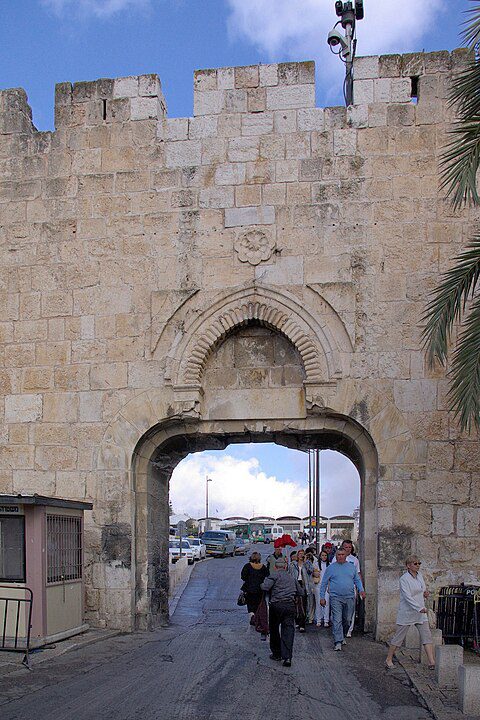I would like to commend to you as a Biblical patron saint of vocation Malchijah the son of Rechab, repairer of the Dung Gate.
Let me explain. . .
I was in North Carolina attending the graduation service of Wilson Hill Academy, an online classical Christian school where my daughter is a Latin teacher and one of the administrators.
The Valedictorian was a young man named Caleb Vogel. (I was glad to hear that he will be attending Patrick Henry College, where I was a literature professor and provost, which is finally getting the academic recognition that it deserves.)
In the course of his valedictory address, which drew on J. R. R. Tolkien’s story that I blogged about Leaf by Niggle, Caleb quoted what he said was one of his favorite Bible verses:
Malchijah the son of Rechab, ruler of the district of Beth-haccherem, repaired the Dung Gate. He rebuilt it and set its doors, its bolts, and its bars. (Nehemiah 3:14)
The audience kind of laughed. But then Caleb explained.
For context, recall that the walls of Jerusalem, along with the Temple, had been torn down when the city was taken by the Babylonians and the people taken into captivity because of their unfaithfulness. But now the King of Persia is allowing the Jews to go back to their homeland. The book of Nehemiah is about the rebuilding of the city walls. That includes putting in the gates. And one of those gates was the Dung Gate, set aside for the removal of human waste, which was hauled to the rubbish dump in the nearby Hinnom Valley. (This was the site of “Tophet,” where the idolaters among the Jews would sacrifice their children to Molech [2 Kings 23:10]. “Ge-Hinnom” was rendered in Greek as “Gehenna,” one of the terms the New Testament uses for the place of eternal punishment, generally translated into English as “Hell” [e.g., Matthew 5:22, 29, 30].)
Caleb made the point that the Dung Gate was a very lowly portal. Indeed, whoever had the job of going through it to take out the city’s sewage was doing a very unpleasant, dirty, and humble task. But the Dung Gate is honored in the Bible. And Malchijah the son of Rechab is honored for repairing it. Just think! His name is recorded for all time in the Word of God itself! As Caleb said, “his name is mentioned in the Bible one more time than mine is.”
This means, Caleb went on to say, that no job is to be looked down upon, that no honest worker should be despised, that even the most menial-seeming, low-status tasks are of great value to God.
Caleb’s speech to the high school graduating class of 2024 was about vocation. And he, along with Malchijah the son of Rechab, is underscoring a very important fact about it.
The recent rediscovery of the doctrine of vocation, which I like to think I had a hand in, has led to what is being called “the faith and work movement,” in which Christians in various professions think through how to live out their faith in their work. But this has led to some criticism. Jeff Haanen, in reviewing a book on the subject, sums up his critique in the title of his essay: The Faith and Work Movement Is Leaving Blue-Collar Workers Behind, with the deck “Can it speak to evangelicals outside high-status professions?”
Christians today often focus on the talents they have been given and the fulfillment they feel in their vocation, which tends to be some high status, highly-paid profession. What about the greater number of workers in dead-end, thankless, and tedious jobs, who are often exploited by their employers? What does all of this talk about “vocation” mean to them?
Well, I would urge those critics to study Luther’s treatment of vocation. He is the great theologian of vocation. He writes much more of lowly, peasant-style labor–the farmer through whom God gives us all our daily bread; the servant girl sweeping the floor–than the upper reaches of the medieval social hierarchy. And Luther writes about the sacrifices and cross-bearing that happen in vocation, as God calls us–not just in our economic activity but even more importantly in our families, the church, and the society–to deny ourselves (not fulfill ourselves) as we use our multiple vocations to love and serve our neighbors.
They should read Gustaf Wingren’s Luther on Vocation. Also, for modern applications, my God at Work: Your Christian Vocations in All of Life; Family Vocation: God’s Calling in Marriage, Parenting, and Childhood (with my daughter Mary Moerbe); and Working for Our Neighbor: A Lutheran Primer on Vocation, Economics, and Ordinary Life.
And let us all remember Malchijiah the son of Rechab, repairer of the Dung Gate.
Photo: Jerusalem, Dung Gate*, by Berthold Werner – Own work, Public Domain, https://commons.wikimedia.org/w/index.php?curid=6034191
*Not the original or the one repaired by Malchijiah (also known as Malchiah). This one was built in the 16th century by the Ottomans.











